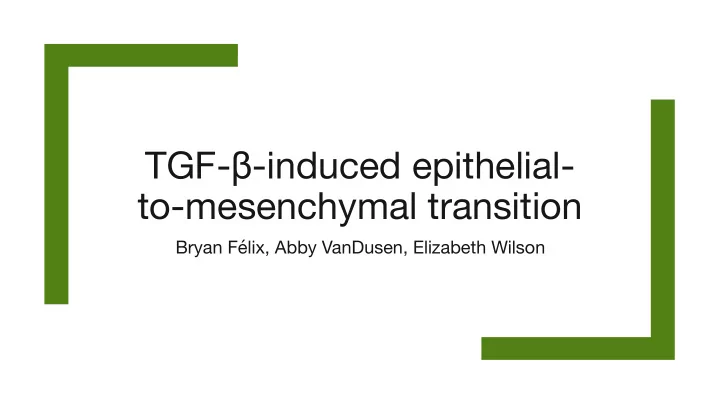

TGF- β -induced epithelial- to-mesenchymal transition Bryan Félix, Abby VanDusen, Elizabeth Wilson
Introduction Epithelial-to-mesenchymal transition ■ “Cancer stem cells” ■ Mesenchymal cells – Lack apical polarity – Lose intercellular tight junctions – Release ECM-degrading enzymes Leads to enhanced migration = metastasis � 2
Introduction TGF- β and previous work ■ E-cadherin: – Epithelial ■ N-cadherin: – Mesenchymal ■ “Partial” EMT state exists Tian, et al. 2013 � 3 Tian, et al., 2013
Model � 4
Model ■ � 5
Model Results ■ E-cadherin: – Epithelial ■ N-cadherin: – Mesenchymal � 6
Model Results Transcription Factors � 7
Model Results N-cadherin vs. Bifurcation T0 E-cadherin vs. T0 E-cadherin vs. k2s � 8
Conclusions ■ SLUG and TWIST are important TF to consider in EMT ■ EMT affected by more than TGF- β input ■ Modeling allows analysis of systems before experimentation ■ Future research – Confirm parameters through experimentation – Consider feedback loop on TWIST – Characterize stability of steady-states – Perform bifurcation analysis for species – Analyze effect of Hill coefficient � 9
References ■ Gupta, S., & Maitra, A. (2016). EMT: Matter of Life or Death? Cell , 164(5), 840-842. ■ Santillán, M. (2008). On the Use of the Hill Functions in Mathematical Models of Gene Regulatory Networks. Mathematical Modelling of Natural Phenomena , 3(2), 85-97. ■ Tian, X., Zhang, H., & Xing, J. (2013). “Coupled Reversible and Irreversible Bistable Switches Underlying TGF β -induced Epithelial to Mesenchymal Transition.” Biophysical Journal , 105(4), 1079-1089. � 10
Recommend
More recommend